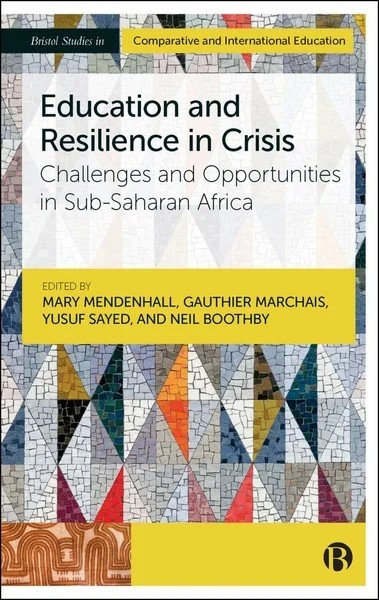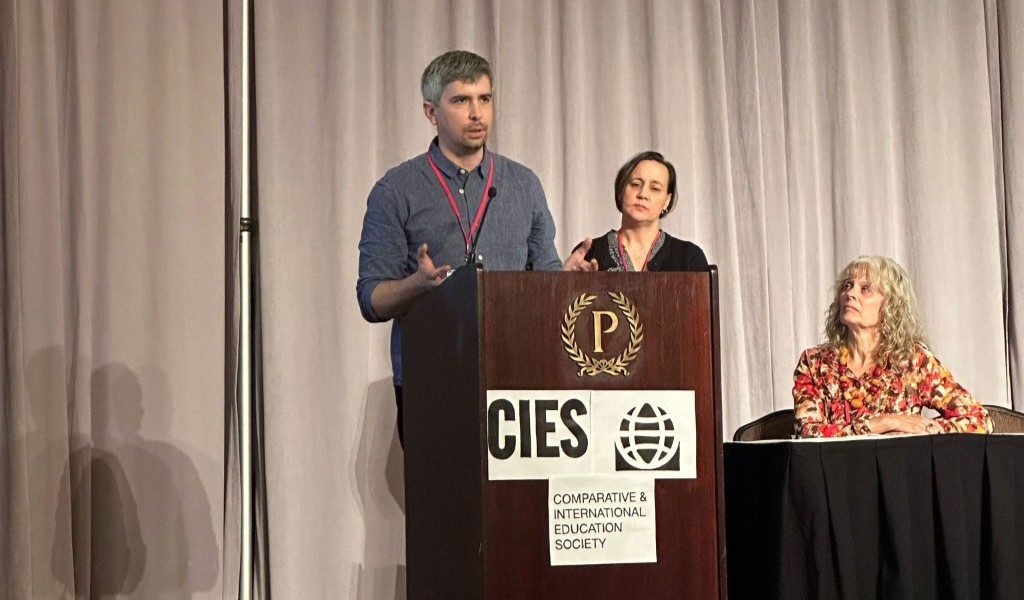Gauthier Marchais, Research Fellow at IDS, has won the Jackie Kirk Outstanding Book Award of the Comparative and International Education Society (CIES) for his work on education in crises.
Gauthier was named alongside co-editors Mary Mendenhall from Columbia University, Yusuf Sayed from the University of Cambridge and Neil Boothby from the University of Notre Dame.
 The authors were recognised for their book, Education and Resilience in Crisis: Challenges and Opportunities in Sub-Saharan Africa, which explores how interconnected crises have affected teaching and learning, on the basis of studies from diverse research-practice partnerships in seven countries: the Democratic Republic of the Congo, Ethiopia, Niger, Somalia, South Sudan, Tanzania and Uganda.
The authors were recognised for their book, Education and Resilience in Crisis: Challenges and Opportunities in Sub-Saharan Africa, which explores how interconnected crises have affected teaching and learning, on the basis of studies from diverse research-practice partnerships in seven countries: the Democratic Republic of the Congo, Ethiopia, Niger, Somalia, South Sudan, Tanzania and Uganda.
The award was formally presented at the CIES 2025 conference in Chicago in March, where Gauthier and Mary Mendenhall gave a speech (see below).
“We are grateful for receiving this award,” said Gauthier. “It reflects collective work done over several years in partnership with the Institut Supérieur Pédagogique de Bukavu, and is therefore shared with all who contributed to it, in particular my co-authors Samuel Matabishi, Cyril Brandt, Diego de la Fuente Stevens, Jean-Benoît Falisse, Sweta Gupta, Pierre Marion, Dieudonné Kanyerhera, Ibrahim Safari, Jean Mukengere Basengezi, Pacifique Nyabagaza, Paulin Bazuzi and Issa Kiemtoré and Deborah West.”

The Jackie Kirk Award honours a published book that exemplifies Jackie Kirk’s commitment to gender equity, education in conflict-affected settings, identity, globalisation, and participatory research methodologies. The award is supported by the Jackie Kirk Memorial Fund, established in 2010, and recognises outstanding scholarship that advances understanding and practice in the field of education in emergencies.
Learn more about the book here: https://bristoluniversitypress.co.uk/education-crisis-and-resilience.
The EU funded research project that informed the book was called Building Resilience in Crisis through Education (BriCE). The project aimed to understand the role of education systems in providing a ‘safe learning environment’ in conflict-affected and fragile regions of the Democratic Republic of the Congo (DRC) and Niger, with a particular focus on the role of teachers.
Read more about our work in governance and conflict
The project found considerable evidence that violent conflict has a direct impact on teachers and students in the schools studied in Niger and DRC, and that the exposure to violence has a clear effect on teachers’ wellbeing and capacity to teach.
CIES Jackie Kirk Award Speech
Mary Mendenhall and Gauthier Marchais
Mary:
Thank you very much. Gauthier and I are here on behalf of our co-editors – Yusuf Sayed and Neil Boothby – and we would like to express our immense gratitude for this recognition. Having had the opportunity to know and collaborate with Jackie Kirk, this is particularly meaningful to me. Her legacy lives on, and the important work that she championed does as well.
This book and all that went into it was truly a collaborative effort. The research teams consisted of multi-disciplinary configurations and partners from the range of countries that were the focus of the research in the Democratic Republic of Congo, Ethiopia, Niger, Somalia, South Sudan, Tanzania, and Uganda. We are standing here, but this work consisted of 24 co-researchers and contributing authors (special shout to former students and now colleagues, Danielle Falk and Daniel Shephard), 21 organizations that were part of the larger humanitarian projects that were being examined, including 126 additional individuals who interacted in some way with the research conducted for the 4 longitudinal studies depicted in the book. We can’t say enough about the importance of doing more collaborative work and the ethical duty to do so. This award goes to all our collaborators.
The crux of this book is how learners, teachers, and school staff experiencing violence, persecution, marginalisation, and destitution as a result of armed conflict, displacement, or natural disasters deploy tremendous efforts to continue to learn, teach, and work. We believe that it is of the utmost importance to centre their perspectives and experiences, and their expertise, in research and policy, not just for ethical reasons, but also as a methodological and epistemic imperative. This requires challenging the hierarchies that inevitably underpin these types of large projects.
Gauthier:
Thanks Mary, and yes, it is the collaborations and their human dimension that made this book.
I would particularly like to honour the team at the Institut Supérieur Pédagogique de Bukavu (ISP Bukavu), which was led by Professor Samuel Matabishi. As the oldest and largest teacher training institute in eastern DRC and as a major research university, ISP Bukavu has produced a wealth of outstanding scholarship on education, peace education, the impact of the eastern Congolese conflict on schools, which has informed this book.
Currently, Bukavu is under military occupation by the M23 Rebellion, and activists, artists, scholars, teachers and educators are facing intimidations, threats and targeted assassinations.
This is a reality that so many educators face around the world, from Sudan to the Sahelian States, from Myanmar to Mexico, to Ukraine and Palestine– educators are subjected to severe levels of violence, and are often deliberately targeted. We owe them our solidarity, and it is our collective responsibility to support them and relay their work, scholarship and voice.
Thank you.
